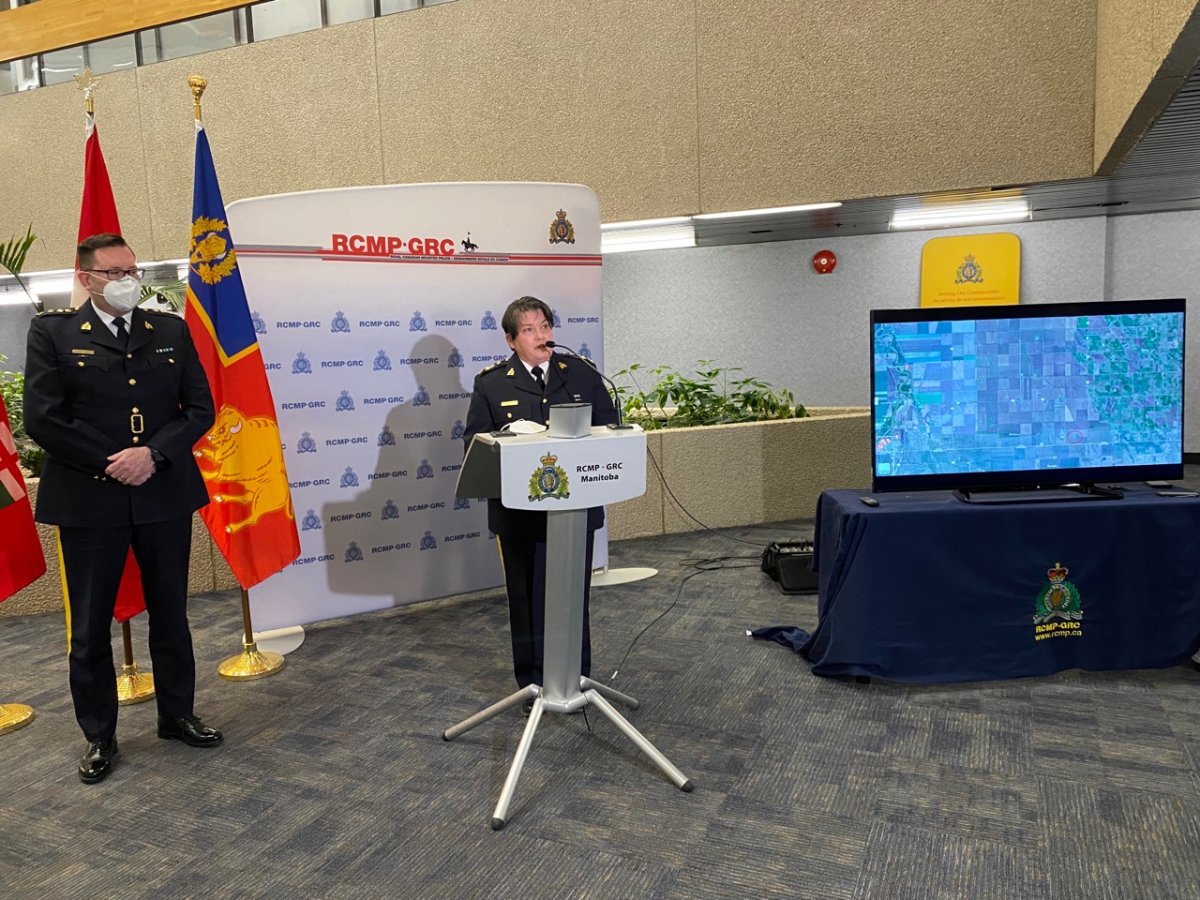Manitoba RCMP say the bodies of four people — two adults, a teen and an infant — were found on the Canadian side of the U.S./Canada border near Emerson on Wednesday.

Jane MacLatchy, Manitoba’s commanding officer, said all four were located within 9-12 metres of the border.
Police are referring to them as victims, as there are concerns the group’s attempted border crossing was facilitated in some way, and that they were left out in the extreme cold.

MacLatchy said work is underway to ID the victims, but at this stage it appears they all died from exposure to the cold.
Manitoba RCMP were notified by U.S. Customs and Border Protection on Wednesday morning that a group of people had crossed into the U.S. near Emerson, and that one of the adults was carrying items intended for a baby, but there was no infant with the group.
An immediate search began on both sides of the border, and by that afternoon, the bodies of an adult man, an adult woman, and an infant were found. The body of a boy believed to be in his mid-teens was found shortly afterward.
The U.S. Attorney’s Office for the district of Minnesota issued a release late Thursday afternoon and said 47-year-old Steve Shand of Florida had been arrested and charged with human smuggling in connection with the incident.
Shand was driving with two passengers determined to be undocumented foreign nationals from India, according to the release.
Inside the vehicle officers found found cases of plastic cups, bottled water, bottled juice and snacks in the van. As they were taking the trio back to the border patrol station in North Dakota, officers came across another group of five Indian nationals walking.
They said they had walked across the border and had expected to be picked up by someone. The group said they estimate they had been walking for more than 11 hours.
Two of them had serious injuries and were transported to a hospital, the release stated.
One person in the group had a backpack he told officials he was carrying for a family of four they had become separated from that contained children’s items such as clothes, a diaper and toy.

Get daily National news
The bodies have been tentatively identified as that family of four, the release from the U.S. Attorney’s Office said.
The 47-year-old suspect is in custody pending a preliminary and detention hearing Monday.
RCMP continued to scour the area after the bodies were discovered, but no further victims have been found.
“It’s very difficult terrain,” said MacLatchy. “When they originally started the search, they realized very quickly that the snow was very deep, drifted in spots.
“They needed all-terrain vehicles, snowmobiles, those sorts of things. Because of the winter conditions right now, it’s virtually impassable.”
“It’s absolutely shocking that this has happened,” RM of Emerson-Franklin Reeve Dave Carlson told 680 CJOB. “What a tragedy.
“You just try to figure out why there would be that kind of desperation to cross the border in such terrible weather conditions. Crossing the border in the best of times, you know, is dangerous.”

Carlson said the crossings “do happen from time to time” but said migrant crossings have slowed down in the past few years, adding that people crossing from Canada to the U.S. is unusual.
“With a different political climate in the United States, I think the United States is attractive again. And that’s why we may see more of this.”
Police said people should not attempt to cross the border in either direction because it can be deadly.
The RCMP said it is working with U.S. Customs and Border Protection and the U.S. Department of Homeland Security.
In a statement, the Canada Border Services Agency said it’s also working with law enforcement partners, as well as its American counterparts, on the investigation.
The office of the Minister of Public Safety said in a statement: “We are shocked and saddened by the tragic deaths of four people attempting to cross the Canada-US border, near Emerson, Manitoba. We extend our most heartfelt condolences to their loved ones, and our thoughts are with them at this difficult time.”
Why do people cross in the middle of nowhere?
Refugees coming from the U.S. or other countries often cross at the Manitoba/U.S. border, and what was a trickle became a flood after the election of former president Donald Trump in 2016. Newcomers to the U.S. were worried they would be deported back to their home countries after Trump’s administration implemented more restrictive rules around immigration.
Emerson, which is the town next to the border crossing, has been dealing with the issue for decades.
In 2016, Manitoba RCMP stopped 444 illegal border crossings.
The former reeve, Greg Janzen, sounded the alarm when 20 refugees were caught crossing into the border town by foot in one day in February of 2017.
“This isn’t normal anymore. In the last nine months this has not been normal,” Janzen said.
Janzen said the town opened its doors to the refugees while they were being processed. They stayed at the town’s community complex for around 12 hours, until border officials could properly deal with the situation, said Janzen.
Canada and the U.S. signed an agreement 15 years ago effectively forcing refugee claimants to request protection in the first safe country they land. The agreement prevents claimants who were refused in one country from hopping the border to try in the other, or from claiming in both.
The agreement, called the Safe Third Country Agreement, applies only to refugee claimants trying to get into Canada from the U.S. at land border crossings, by train and at airports.
There are some exceptions, mostly applied to ensure families can remain united. But for some who have recently come over, the Safe Third Country Agreement means they would be turned away at actual land borders.
Their only hope of starting the asylum process in Canada is to walk over an unguarded section of the Canada-U.S. border.
The Safe Third Country Agreement and whether it should be struck down is currently tied up in court.
Experts say the stories of those desperate to cross the Canada-U.S. border have remained the same throughout the pandemic, despite going unnoticed. While the specific circumstances in today’s case are unknown, there are larger trends at play.
Ethnocultural Council of Manitoba project manager Maggie Yeboah said a lot of border crossers are simply scared and in need of support.
“I think our government needs to make sure all immigrants, including undocumented migrants, refugees, asylum seekers, and international students all have access to services in our city and in our country.”
— with files from The Canadian Press and Amy Minsky













Comments